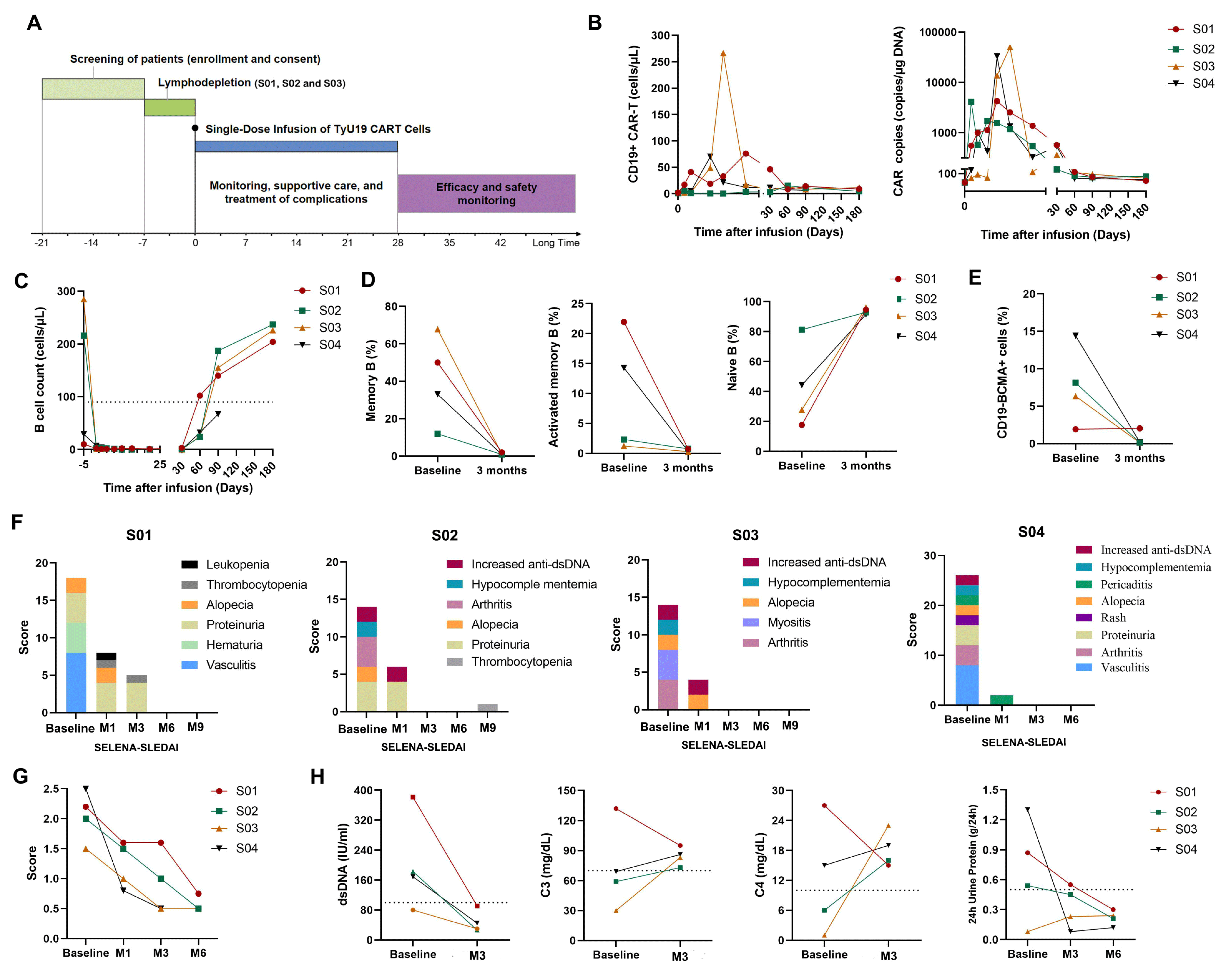Session Information
Date: Tuesday, October 28, 2025
Title: (2437–2469) Systemic Lupus Erythematosus – Treatment Poster III
Session Type: Poster Session C
Session Time: 10:30AM-12:30PM
Background/Purpose: Systemic lupus erythematosus (SLE) is a chronic autoimmune disease associated with significant morbidity and mortality. The treatment approach for SLE primarily involves immunomodulation and immunosuppression. However, these drugs have considerable toxicity and are not effective in all patients. Autologous CD19-targeted CAR-T therapies has been explored in several autoimmune diseases and reported promising efficacy in recent studies. In this study, a healthy donor-derived, multiplex genome-edited allogeneic CD19-targeted CAR-T product (BRL-303) was developed for refractory autoimmune diseases patients. Here we report the efficacy and safety profile of BRL-303 in treating patients with systemic lupus erythematosus (SLE).
Methods: This is an investigator-initiated trial evaluated the safety and efficacy of BRL-303 in adult patients with refractory autoimmune diseases (NCT05988216). Participants were screened and underwent lymphodepletion chemotherapy with cyclophosphamide (300 mg/m², day -5 to -4) and fludarabine (25 mg/m², day -5 to -3), then BRL-303 infusion at day 0 with a dose level of 1×106 cells/kg. For Patient SLE-04, the CAR-T cells were directly infused without lymphodepletion. After BRL-303 infusion, each patient underwent safety and efficacy assessment according to protocol.
Results: As of March 16, 2025, 4 patients with refractory systemic lupus erythematosus have been treated. These patients were unable to control disease progression despite treatment with corticosteroids and various immunosuppressants. After BRL-303 infusion, CAR -T cells in all subjects were significantly expanded. Notably, Patient SLE-03 &SLE-04 exhibited the most robust CAR-T cell expansion, with peak CAR copy numbers reaching 13,680 copies/μg on day 14 and 33,171 copies/μg on day 10 post-infusion, respectively . CAR-T cells remained detectable in all patients at 3 months. With expansion of BRL-303, B cells in peripheral blood of patients reached deep and persistent depletion about 1~3 months. After BRL-303 infusion, all subjects met the Systemic Lupus International Collaborating Clinics (SLICC) criteria for a sustained response (SRI-4) and achieved a SELENA-SLEDAI score of zero and a PGA score<1 at 3 to 6 Months. Moreover, all subjects showed a significant decrease in serum ds-DNA and increase in complements (C3 and C4) within one month. Meanwhile, proteinuria also resolved in all subjects. Importantly,SLE-01 discontinued all immunomodulatory and immunosuppressive medications, including glucocorticoids, at 3 months, achieving drug-free remission, while other patients require low-dose glucocorticoid maintenance therapy (≤5mg). All of them developed grade 1 CRS for 2 or 3 days, no ICANS and GvHD observed.
Conclusion: Overall, SLE subjects treated with BRL-303 achieved significant clinical remission, with a controllable safety profile, offering a potential paradigm shift for SLE patients who are refractory to currently available treatments. Further observation of SLE and more autoimmune disorders treated with BRL-303 are ongoing in our study.
 Figure 1. Study process diagram and Effects of BRL-303 for SLE patient (A, Therapeutic timelines; B, BRL-303 detected by flow and qPCR; C, Absolute B cells value; D and E, Changes in the numbers of memory B cells (CD21+CD27+), activated memory B cells (CD11c+CD21lo), naïve B cells (CD21+CD27−) and CD19-BCMA+ plasma cells in PBMC at 3 months after infusion; F and G, SELENA-SLEDAI and PGA change before and after BRL-303 treatment; H, SLEDAI-2K Score changs; C, Serological and 24h urine protein changes )
Figure 1. Study process diagram and Effects of BRL-303 for SLE patient (A, Therapeutic timelines; B, BRL-303 detected by flow and qPCR; C, Absolute B cells value; D and E, Changes in the numbers of memory B cells (CD21+CD27+), activated memory B cells (CD11c+CD21lo), naïve B cells (CD21+CD27−) and CD19-BCMA+ plasma cells in PBMC at 3 months after infusion; F and G, SELENA-SLEDAI and PGA change before and after BRL-303 treatment; H, SLEDAI-2K Score changs; C, Serological and 24h urine protein changes )
To cite this abstract in AMA style:
Yang C, Sun C, Tan B, Hu C, Wan L, Xie C, Tan Q, Liu M, Lin J, Du B, Tong H. Allogenic anti- CD19 CAR-T cells induce remission in refractory systemic lupus erythematosus [abstract]. Arthritis Rheumatol. 2025; 77 (suppl 9). https://acrabstracts.org/abstract/allogenic-anti-cd19-car-t-cells-induce-remission-in-refractory-systemic-lupus-erythematosus/. Accessed .« Back to ACR Convergence 2025
ACR Meeting Abstracts - https://acrabstracts.org/abstract/allogenic-anti-cd19-car-t-cells-induce-remission-in-refractory-systemic-lupus-erythematosus/
